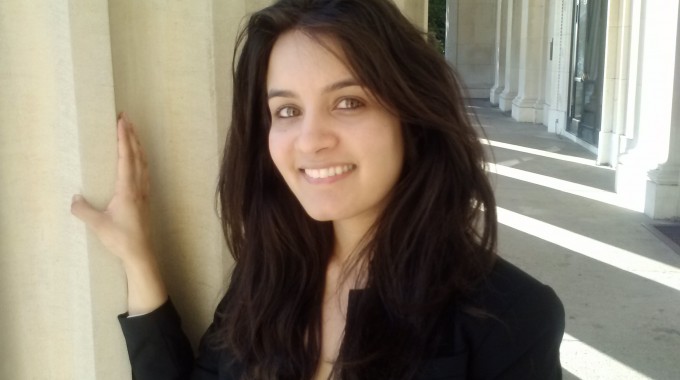If you know of a Columbia College student, faculty member, alumnus/alumna or program we should spotlight, or if you would like to submit a story, please contact:
Columbia College
Office of Communications
cc-comms@columbia.edu

“The questions I was asking had to do with structural problems. How does poverty contribute to a healthcare system? What problems do vaccine campaigns run into?”
Like so many who discover new callings as undergraduates, Zahra Bhaiwala CC’14 enrolled in the College looking to prepare for medical school but now has a new dream of addressing conflict-related public health issues in the Middle East.
Bhaiwala took a transitional step in that direction this past summer as a paid analyst in Pfizer’s Global Outcomes Research department, where she reviewed existing literature on the worldwide incidence and financial burden of bone demineralization and renal problems in HIV patients. Using economic modeling, she projected the cost of such complications. Ahmed Shelbaya PH ’01, director of global outcomes research at Pfizer and a lecturer at the Mailman School of Public Health, was impressed with the approach Bhaiwala brought to her assignment. “Zahra is passionate about global health,” he says. “She is concerned about the underserved and vulnerable of the world. She is engaged with what is happening politically, economically and culturally around the world, and she is culturally fluent.”
After three years of scientific research as an intern at P&S and Harvard Medical School, Bhaiwala sought more macro level analysis at Pfizer. “I realized my interest in healthcare is not the scientific aspect,” she says. “The questions I was asking had to do with structural problems. How does poverty contribute to a healthcare system? What problems do vaccine campaigns run into?”
While with P&S during her first three years in the College, Bhaiwala investigated noninvasive diagnostics techniques for glioblastoma, the most common and aggressive type of malignant brain tumor, and researched the role that T cells and their receptors play in the cancer’s development. In 2012, she received a Summer Undergraduate Research Fellowship from the department of biological sciences to support that research. Bhaiwala, now editor-in-chief of the Columbia Undergraduate Science Journal,also spent summers 2010 and 2011 as a paid intern at Harvard, where she searched for correlations between genetic mutations and birth defects in mice.
The Andover, Mass., native, who majors in biological sciences and Middle Eastern, South Asian and African studies, chose the College largely due to her regard for those departments. “My interests in politics, international policy and culture, combined with my interest in health care, have grown,” says Bhaiwala, citing the recent prevalence of birth defects in Iraq, which some believe is the result of war pollutants, as an example of an issue she hopes to delve into. “I’ve realized that the health of a population is not just heart rate or blood pressure; you have to look at the whole person, the whole society.”
Bhaiwala, the daughter of a Pakistani mother and an Indian father, has been fascinated by the Middle East since high school, when she, her parents and younger brother embarked on a leisure tour of Egypt, Jordan, Saudi Arabia and Israel. During her freshman year in the College, while on winter break, she accompanied her family on a pilgrimage to the Imam Ali Mosque and the Shrine of Imam Hussein ibn Ali in Iraq. “I managed to sneak out when we weren’t doing anything and talk to people, which was fun,” recalls Bhaiwala, who attended an Islamic grade school where she achieved proficiency in Arabic. “I felt really at home in a lot of those countries. That sparked an interest for me and I started following politics and international affairs in that region.”
Bhaiwala, who grew up speaking Urdu and Hindi and is fluent in Spanish, also spent her freshman and sophomore spring breaks taking patient information and performing triage at free medical clinics in La Antigua, Guatemala and Cusco, Peru, respectively. Both volunteer trips were organized by the Columbia University American Medical Students Association–Premedical Chapter.
As co-chair of the chapter’s global health committee, a position she has held since her junior year, Bhaiwala helped create a global health curriculum that chapter members teach to middle school students at the Double Discovery Center of Columbia College once a week during the school year. She also is active with the Columbia University Muslim Students Association and, since June 2012, has tutored recently incarcerated young men for the GED exam through Getting Out and Staying Out, an NYC nonprofit.
Several times a semester, Bhaiwala performs at campus events with CU Sur, a South Asian student a cappella group. During her free time, she enjoys exploring the city’s ethnic neighborhoods. “I love that you can step on the subway and every few stops you are in a different demographic,” she says.
Nathalie Alonso CC’08, from Queens, is a freelance journalist and an editorial producer for LasMayores.com, Major League Baseball’s official Spanish language website. This article was originally published in Columbia College Today.